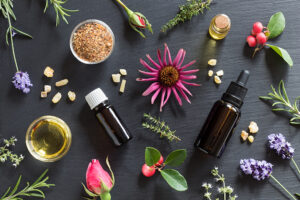Natural therapies and self-guided treatment have seen a rise in popularity, allowing them to be used in conjunction with regular mental health care or replacing it all together. They provide a more holistic way of looking at therapy which emphasizes self healing.
Natural therapies include herbal supplements, acupuncture and much more, and are useful in solving anxiety issues, depression, sleep problems, as well as boosting one’s mood and relaxing the mind.
Anxiety
Anxiety is a powerful experience that can put a person’s life on hold, making it challenging to work, build relationships, and even sleep or eat. Some symptoms are physical too; you might find increased heart rate, sweating, or dizziness ocuring. The great news is that anxiety is one of the easiest disorders to treat with natural remedies and lifestyle changes. Suffering from anxiety doesn’t mean you have to refrain from using medication or talk therapy; these are great coping mechanisms and with the right lifestyle changes, you can greatly reduce the level of anxiety you feel.
For treating anxiety, I can suggest sleep and caffeine, but chamomile tea works wonders as well, plus it’s a tasty way to rehydrate. These tactics may not work for everyone and for those already taking medications for anxiety, it is important to first speak to your doctor before trying anything new.
Lemon Balm, which is known as Melissa officinalis, has been proven useful in treating all degree of anxiety and depression symptoms while providing a calming effect that is safe. Kava is especially useful for anxiety and is widely regarded as an anxiety remedy. In addition, some studies have shown that Valerian Root can help with anxiety as well, but it is important to be cautious, as Valerian Root taken with blood thinners is not advisable due to increased risk of bleeding.
Depression
Depression is one of the commonest among mental disorders, and it can hamper a person’s ability to live his or her life to the fullest. While the task of treating depression is undoubtedly challenging, it is important to utilize, medications, talk therapy (even telehealth services), and natural remedies to treat depression.
Herbal depression remedies such as St. John’s Wort can effectively alleviate depression symptoms, but do remember that these herbs can interact with existing antidepressants. Always ensure to talk to a doctor regarding the side effects that may occur when attempting herbal treatments.
The following herbs are worth noting, for black cohosh, chamomile, passionflower, and saffron can be helpful for depression. A secondary examination is necessary, though, to determine if they can provide assistance for depression. But remedies such as S-adenosyl methionine and 5-HTP are nonherbal remedies which are known to work.
Including yoga, meditation, and other relaxation exercises in one’s daily routine can be beneficial towards lessening depression. Simply eating a healthy diet balanced with essential minerals and vitamins can help in curing this disease too. Herbal treatments or sleep hygiene can improve one’s mood or lessen the chances of insomnia symptoms.
When it comes to deciding which herbs to include in a treatment plan, think of your distinct mental health needs and aspirations. Certain herbs, supplements, and even medications might have adverse effects on someone’s body depending on their medical history or existing illnesses. Price is another thing which influences which herbal assumption someone will choose.
Sleep
There are a great deal of risks that stem from poor sleep, which include heart disease, diabetes, and high blood pressure. Luckily, having reduced energy and a horrible mood are symptoms that are curable with a bit of natural medicine.
A lot of herbs can help with insomnia, but due to a lack of money and research studies, herbs are often not looked into. This is primarily because unlike drugs, herbs are not patentable, making it harder to conduct scientific trials compared to herbal treatments being tested against placebo treatments.
It’s especially helpful to note valerian root tea as it has been shown numerous times to help insomnia sufferers sleep better. Tablets, capsules, and tinctures will also shorten time it takes to fall asleep as well as make the quality of sleep there is better, which is the goal for people who suffer from insomnia. In one trial, valerian root was shown to improve sleep quality and reduce time to fall asleep.
Chamomile tea can also make people feel drowsy, especially so for children due to how gentle it is on the stomach. Many health food shops should have it as an herbal supplement or as an amino acid that aids sleep by transforming into serotonin, L-tryptophan.
Both acupuncture and acupressure are gentle methods that can be helpful in improving sleep. These approaches do not require a prescription, but it is best to inform your physician about any treatments you try outside of the normal boundaries so they can advise you about interactions with medications prescribed to you.
Stress
Stress is your body’s answer to the challenges of life. Small amounts of stress can be good, for example, when an unexpected car heads toward you, and you slam on the brakes. In addition, when placing an important game, stress could provide extra energy. Long-term stress, or chronic stress, is bad. It can lower the immune system, cause digestive issues, increase weight and IBS, heighten the risk of heart disease, and change brain chemistry to such an extent that anxiety and depression become possible.
Figure out what causes you stress and deal with them ahead of time. This is a big part of wellness, whether that means feeling swamped with work, struggling with money, or having challenging relationships. But in cases when symptoms become very acute or you feel that coping with the situation becomes impossible, it would be best to consult a physician who will assess your condition and refer you to a therapist or counselor.
Besides therapy, botanical medicines are helpful for stress management and sleep improvement. Withania somnifera (Ashwagandha) and Rhodiola have both been shown to alleviate body stress by lowering cortisol, as well as having an antidepressant effect from the calming GABA release in the central nervous system. These plants also have long histories of being used in traditional medicine and are easily obtainable in the form of teas, capsules, or tinctures.




